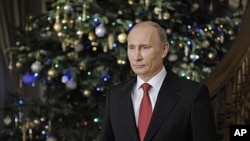After a 12-day Christmas and New Year’s holiday, political opposition to Prime Minister Vladimir Putin and protests of last month's parliamentary election show no sign of easing.
On his first day back at work, Russian opposition leader Vladimir Ryzhkov is on his fifth press interview, promoting a mass march on the Kremlin.
"Our strategy is to organize big, big actions," he says. "Not often, but big actions, with real political effect."
Ryzhkov is not alone. One month in advance of the march, almost 15,000 people have signed up via Facebook to join the protest. In a nationwide survey taken before the holiday break, one-half of respondents predicted the protests will continue, and one-half predicted that Russia’s political situation will deteriorate.
Only 36 percent of those polled said they will vote for Putin in the March 4 presidential elections. That figure is one-half of the 71 percent of votes he received the last time he faced voters in 2004. An American political scientist at Moscow's New Economic School, Sam Greene, says the Kremlin is realizing the ruling party and other support groups are proving to be hollow.
"They created all these pseudo institutions, like United Russia, and all of a sudden they realize [they] do not have actually a power base," he says. "They do not have links with constituencies that can come out and support them."
During the holiday, Russia’s prime minister was uncharacteristically silent. In his annual New Year’s message, Putin sought to minimize the unprecedented opposition to his rule.
Noting Russia is between parliamentary elections in December and presidential elections in March, he said today’s turbulence is "the cost of democracy."
Russia’s ruler of 12 years left it to his former finance minister, Alexei Kudrin, to extend a hand to the opposition. Kudrin called for dialogue with the opposition, new parliamentary elections and the firing of Russia’s chief elections official.
But Ryzhkov, the opposition leader, says Kudrin is flying solo.
"Kudrin initiative is his personal initiative. He has no responsibility, he has no mandate from Putin," he says.
Another call for dialogue came on January 7, Christmas Day in the Orthodox Christian world, when Russian Orthodox Church Patriarch Kirill used his Christmas interview on Rossiya 1 TV to warn the Kremlin about the danger of not listening to protesters.
If Russia’s rulers remain deaf to the protests, it is "a very bad sign, a sign of the authorities’ inability to adjust," he warned.
Drawing on history, Patriarch Kirill said the last time Russian rulers did not listen to mass protests, radicals hijacked the protest movement and forced the nation into communism.
If the nation had been spared the communist revolution, he said, Russia would have twice the population of today and be ahead of the United States in many scientific fields.
Earlier, another senior church official, Archpriest Vsevolod Chaplin, warned that if authorities did not respond to the protesters, the nation’s leadership would be "slowly eaten alive."
Anti-Putin Opposition Robust After Holidays
- By James Brooke




